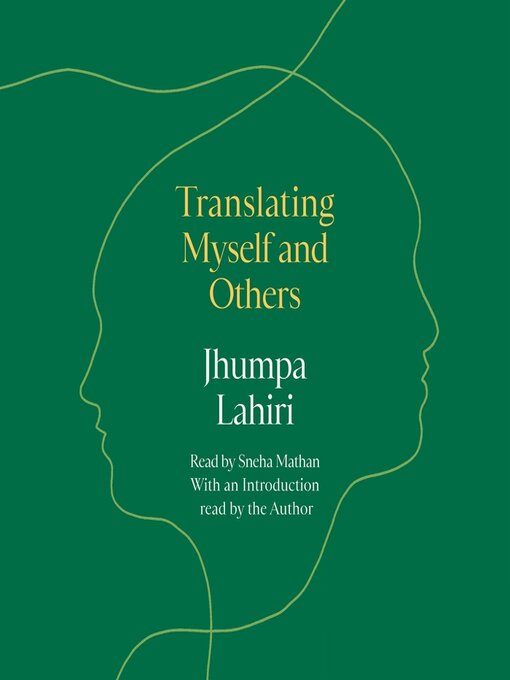Published June 13th, 2022
Review
by Steven G. Kellman
This time we are doing something a little bit different with this book review, because Jhumpa Lahiri is not an ESL writer. She grew up speaking English but, deep into her literary career, decided to write and publish in Italian instead. Translating Myself and Others (2022) recounts her translingual journey. Her first book in Italian, the language memoir In altre parole, appeared in 2015 (an English translation, In Other Words, followed in 2016). Many other translinguals — e.g., Julia Alvarez, Ha Jin, Aleksandar Hemon, Ilya Kaminsky — adopt the language of the country they migrate to. However, though born in London, Lahiri grew up in Rhode Island and now lives in New Jersey, where Italian is only the fifth most widely spoken language. Italy never colonized North America, so for Lahiri, unlike Chinua Achebe, Raja Rao, and Léopold Senghor, translingual writing did not mean adopting the language of the imperial power.
Prior to 2015, Lahiri, whose mother’s — and father’s — tongue was Bengali, had established an international reputation as a brilliant author of Anglophone fiction with two novels — The Namesake (2003) and The Lowland (2013) — and two-story collections — Interpreter of Maladies (1999) and Unaccustomed Earth (2008). Had they been written in Italian rather than English, they likely would not have attracted the same wide readership. While English has the largest number of total speakers — 1.452 billion — of any language in the world, Italian, with 67.9 million total speakers, is only 29th among the world’s languages. For an accomplished, celebrated Anglophone writer to choose Italian as her medium is to sacrifice solid practical advantages and create a formidable marketing handicap. Following a trajectory opposite to Lahiri’s, from Italian to his sixth language, English, Rafael Sabatini — who explained: “All the best stories are written in English,” — made himself rich and famous with such Anglophone crowd-pleasers as The Sea Hawk (1915), Scaramouche (1921), and Captain Blood (1922). A bestseller in Dutch or Finnish cannot count on as many readers as a midlist title in English or Spanish.
Lahiri is almost unique among translinguals in that her choice of language is not a product of migration, colonialism, or commercial pressures. Writing in Italian is for her an acte gratuit, an assertion of free will unsullied by motives other than the love for the language that seized Lahiri, now fifty-four, when she first visited Florence at age twenty-five. “I write in Italian to feel free,” she explains in her new book, Translating Myself and Others. Like Ikebana, the delicate Japanese art of floral arrangement, Lahiri’s discipline of writing in Italian has no ulterior motive other than exploration of the medium. She practices art for art’s sake, consistent with her belief that: “Once art weds itself to a social or political purpose it is bled of its true purpose, which is not to change the world but to explore the phenomenon and the consequences of change itself.” As both a translator and a translingual writer, she is especially well-positioned to scrutinize change itself.

Although Antonio Gramsci, the Marxist philosopher and politician, might seem the antithesis of Lahiri’s aesthetic approach, she devotes a chapter to the letters and diaries he wrote while confined to a Fascist prison during the last ten years of his life, from 1926-37. Paying scant attention to his political theory, she focuses on stylistic features of his texts, particularly his self-conscious use of language. Regarding Gramsci as “an icon of translation,” she notes how language study — of Russian, German, Greek, Latin, French, English, and Sanskrit — was his primary activity while incarcerated. Gramsci, who was married to a translator, not only makes frequent reference to translation, but, according to Lahiri, “read everything as a translator, whether he intended to translate it or not.” She celebrates his writings not for their political doctrine but for the artistry achieved through layers of language: “What makes the letters a great of work of literature is the complexity of the voice.”
By the time she came to write In altre parole, an autobiographical account of how, smitten by Italian, she wrote the book in that language, Lahiri was finding the sound of English repellent. “Provo un senso di estraneità,” she writes, “Come se mi imbattessi in un fidanzato di cui ero stufa, qualcuno che avevo lasciato anni fa. Non mi seduce più.” She was so estranged from English that she refused to translate her own book, entrusting the task, instead, to Ann Goldstein, who renders that statement as: “I feel alienated. As if I’d run into a boyfriend I’d tired of, someone I’d left years earlier. He no longer appeals to me.” The book was published in the United States as In altre parole/ In Other Words, a dual-language edition, Lahiri’s Italian on the verso page, Goldstein’s English on the recto. New York Times critic Dwight Garner dismissed the work as “a soft, repetitive, self-dramatic and self-hobbled book,” and expressed the hope that Lahiri would put this linguistic experiment behind her and return to writing in English.
She did not. She has since published one book of nonfiction, Il vestito dei libri (2015), translated by her husband Alberto Vouvoulias-Bush as The Clothing of Books (2015), one novel, Dove mi trovo (2018), and one book of poetry, Il quaderno di Nerina (2021) — all in Italian. She has not published any fiction in English since The Lowland, which won the 2015 DSC Prize for South Asian Literature. However, despite her refusal to translate In Altre Parole, lest it draw her back into English, Lahiri did overcome her opposition to self-translation, rendering Dove mi trovo into English as Whereabouts (2021). And she has been quite active in translating the work of others — three novels by Domenico Starnone: Lacci (2014), Scherzetto (2016), and Confidenza (2019), as Ties (2017), Trick (2018), and Trust (2021), respectively. She also translated six of the offerings in The Penguin Book of Italian Short Stories (2020), which she edited.
Several of the essays Lahiri collects in Translating Myself and Others were written in English, but others were written in Italian and then translated into English by the author or someone else. Lahiri reports that her admiration for Starnone’s fiction tempted her into translation, which she now realizes is “central to the production of literature, not an accessory to it.” Despite her fears that transforming a text into English would pull the plug on her immersion in Italian, “in a joyous state of self-exile from the language (English) and the country (the United States) that have marked me most significantly,” she discovers it has the opposite effect. Since “translation is the most intense form of reading and rereading there is,” she was forced into an extraordinary intimacy with Starnone’s Italian words.
Her experience with self-translation was similar. She recounts in detail how, going back and forth between Dove mi trovo and the nascent text of Whereabouts, she was constantly making adjustments to each. In the end, the second edition of Dove mi trovo will contain extensive revisions that her engagement with it for the purposes of translation made possible and necessary. “Becoming my own translator in English has only lodged me further inside the Italian language,” she concludes.

Lahiri notes that her infatuation with Starnone’s Lacci led her to translate the novel, since: “There is no better or more satisfying way to satisfy one’s love for a text than to translate it.” No text has inspired in her a greater love than Metamorphoses, which she reports she and a Princeton colleague are currently translating from Latin into English (not Italian). Ovid’s poem is a collection of myths about transformation, of humans and deities into stones, stars, animals, and other entities. Lahiri reads Metamorphoses as an allegory of translation, which is of course transformation, an apt description of the course of life itself. She devotes an entire chapter to analyzing Ovid’s account of the story of Echo and Narcissus. Condemned by Zeus merely to repeat what others have said, Echo falls in love with Narcissus, who can love only himself. Devastated by unrequited love, Echo wastes away, reduced to a voice incapable of original expression. Lahiri teases out the complexities of the Echo-Narcissus relationship and its implications for the role of love in translation. The co-dependency of the two figures also challenges conventional distinctions between originality and adaptation.
Lahiri’s translingualism is not a binary matter. In addition to the continuing push-pull of Italian and English, Bengali, a dormant vestige of her early childhood, continues to exert a gravitational force on her. Latin also asserts itself in the detailed discussion of Metamorphoses; she quotes extensively from Ovid’s own words, followed by her English translation. Elsewhere, she cites the Latin texts of other ancient authors, including Horace and Pliny the Elder. Lahiri’s entire book begins with an appropriate epigraph from Lucretius’s De Rerum Natura: “in multas igitur voces vox una repente diffugit” (into many voices, therefore, one suddenly disperses).
Furthermore, an entire chapter, titled “An Ode to the Mighty Optative,” focuses on Aristotle’s famous distinction between history as the representation of what has happened and poetry as the imitation of what might be. Lahiri quotes from the Poetics to make her point, that: “If literature were its own language — and I believe that it is — its principal mood would be the optative.” She uses the ancient Greek to support an (overly) technical analysis of the optative, which does not quite exist in English grammar. She seems not to be interested in Aristotle’s insight that history is a representation of contingency, poetry of necessity.
Since Lahiri’s vision of ceaseless transformation portrays the literary universe as a chamber of echoes, it is no surprise that the title of her book, Translating Myself and Others, parrots another book, a 1975 collection of essays by Philip Roth, Reading Myself and Others. The resemblance might demonstrate nothing more than packaging wit, though Roth’s position in Jewish American fiction was roughly parallel to pre-Italian Lahiri’s in Indian American fiction. In both books, the authors reflect on their own writings as well as those with whom they felt elective affinities — in Lahiri’s case, with Starnone and Ovid, in Roth’s with Franz Kafka and Milan Kundera. Unlike Lahiri, Roth was not, strictly speaking, a translator, but, especially through the “Writers from the Other Europe” series he edited for Penguin, he did serve as a mediator between cultures, introducing the work of Tadeusz Borowski, Witold Gombrowicz, Bohumil Hrabal, Danilo Kîs, and Bruno Schulz to Anglophone readers.
Lahiri’s Ovidian conception of literature — and life — is the enemy of stasis and complacency. Everything is in a state of transformation, of translation, and, because literary relationships are always in flux, there is no permanent, stable text. Just as every translation alters what it translates, every language a speaker adapts alters — and quickens — the speaker. Inert phrases are fatal. The question “Why write in Italian?” echoes throughout this book, and Lahiri’s most compelling answer recalls Viktor Shklovsky’s concept of ostranenie, of how art defamiliarizes an automatized world and thereby brings it back to life. “Familiarity, dexterity, and ease with a language can confer another form of blindness,” Lahiri explains. “One tends to feel safe, and thus more passive, perhaps even lazy. I can write in English without straining as I must in Italian, without having to examine and double-check almost every word.” Jhumpa Lahiri continues her restless project of double-checking the world.
Nationality: American
First Language(s): English
Second Language(s):
French,
Hebrew
Supported by:


Comments on "The Constant Flux of Literature — A review of "Translating Myself and Others" by Jhumpa Lahiri"
Please log in to submit a comment.
Login